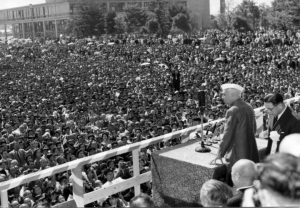India’s Prime Minister to visit Hiroshima for first time since its nuclear test
May 18, 2023
Indian residents in Hiroshima welcome visit as “significant”
by Michiko Tanaka, Staff Writer
Timed to the summit meeting of G7 (G7 summit, attended by the Group of Seven industrialized nations), Narendra Damodardas Modi, Prime Minister of India, a nuclear-armed state, will visit Hiroshima City. Mr. Modi will be the first incumbent president of India to visit Hiroshima since 1974, when the nation went ahead with the first nuclear test. The Japanese government plans to include a tour of the Hiroshima Peace Memorial Museum, located in the city’s Naka Ward, into Mr. Modi’s schedule. Some Indian natives living in Hiroshima welcomed his visit, saying, “It will be a significant visit.”
Joseph James, 66, who originally comes from the southern part of India and now lives in Higashihiroshima City, said he hoped the prime minister would listen to the voices of A-bomb survivors. Mr. Joseph runs a citizens’ group to help promote exchange between Japanese people and Indian people. He hopes the prime minister will learn about how much damage a nuclear weapon has brought to humanity, and that Hiroshima will be a venue where the prime minister will discuss what India can do along with the G7.
In 1974, India carried out a nuclear test, partly because China, with which it had been in conflict over a boundary, possessed nuclear weapons ahead of India. India became, de facto, the sixth nuclear-armed state in the world, insisting on “peaceful use” of nuclear power. India has not joined the Nuclear Non-proliferation Treaty (NPT), citing the inequality of the treaty that allows the only five nations of the United States, Russia, the United Kingdome, France and China to possess nuclear weapons.
Pakistan, a neighboring country of India, also accelerated its nuclear development, competing against India. In 1998, both India and Pakistan conducted underground nuclear tests in succession. Afterwards, India announced a moratorium on nuclear experiments and the policy of “no-first-use” of nuclear weapons. But India, as well as Pakistan, has not signed the Comprehensive Nuclear-Test-Ban Treaty (CTBT), adopted by the United Nations in 1996.
India once criticized nuclear armament and nuclear tests by major powers. The first prime minister of India, Jawaharlal Nehru, visited Hiroshima Peace Memorial Park in the city’s Naka Ward in 1957. He offered flowers at the Cenotaph for the A-bomb Victims and delivered a speech in front of citizens that had flocked to the park.
Mr. Nehru said we were required to answer a question whether to annihilate humanity by misusing atomic and hydrogen bombs again or create a world based on love, the teachings of Buddha, and the spirit of mercy. He also appealed to the world to learn from Hiroshima.
Mr. Modi will be the first incumbent prime minister to visit Hiroshima since Mr. Nehru. Desarda Kunal, 22, an Indian research student at the graduate school of Hiroshima University, said we should eliminate nuclear weapons. He hopes world leaders will change their perception of nuclear damage in Hiroshima, and that their renewed perception will serve as a step to steer discussion in the right direction.
(Originally published on May 18, 2023)







